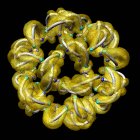A Role for MicroRNA in Learning and Memory
 In neural networks, learning and memory are accomplished by changes in the connection strength between neurons. This 'synaptic efficacy' can be changed in many ways: the number of vesicles released, the number of receptors, changes in the alignment of the pre- and post-synaptic membranes along the synaptic cleft, changes in the rate of neurotransmitter reuptake and metabolic breakdown, myelination, and even the growth of entirely new dendritic spines.
In neural networks, learning and memory are accomplished by changes in the connection strength between neurons. This 'synaptic efficacy' can be changed in many ways: the number of vesicles released, the number of receptors, changes in the alignment of the pre- and post-synaptic membranes along the synaptic cleft, changes in the rate of neurotransmitter reuptake and metabolic breakdown, myelination, and even the growth of entirely new dendritic spines. Dendritic remodeling can occur extremely quickly - in vivo imaging of drosophilia dendrites shows remarkable structural changes within just 3 minutes of learning (I have a video of this if anyone is curious). After looking at neuroscience text books and static images of complex neural networks, it's easy to forget that the mass of interconnected tissue known as 'brain' is constantly rearranging itself in space.
Researchers from Harvard and the Medical University of Vienna have shown that at least some of this complicated spatiotemporal structural change is mediated by microRNAs. microRNA's are small, non-coding sequences that modulate the translation of messenger RNAs (mRNA) by binding to complementary sequences; previously no one had identified the specific micro- and messenger-RNAs that were involved in synaptic change. And it's no wonder, since they seem very hard to find: the microRNA they identified, miR-134, is brain-specific and localized to hippocampal dendritic spines. It was shown to negatively regulate the size of dendritic spines by inhibiting the encoding of a protein kinase that is necessary for spine growth, while an "antisense" inhibitor of miR-134 can cause an increase in dendritic spine size.
While mainstream cognitive science now undergoes a transformation into cognitive neuroscience, ending a long period of "agnosticism towards the brain," it does not yet embrace genetic factors (that is left to the "behavioral geneticists"). I can only imagine that thiry years from now, once cognitive neuroscience is better understood, we'll see yet another transformation take place: cognitive neuroscience transforms into cognitive neurogenetics. This will end the period of "agnosticism towards genetics" which is just now replacing mainstream cognitive science's previous "agnosticism towards the brain."
Related Posts: Molecular Basis of Memory


1 Comments:
Hi, I am very curious about the video about dendritic remodeling. Could please tell me how to see it? My email is young.asap@gmail.com :)
Post a Comment
<< Home